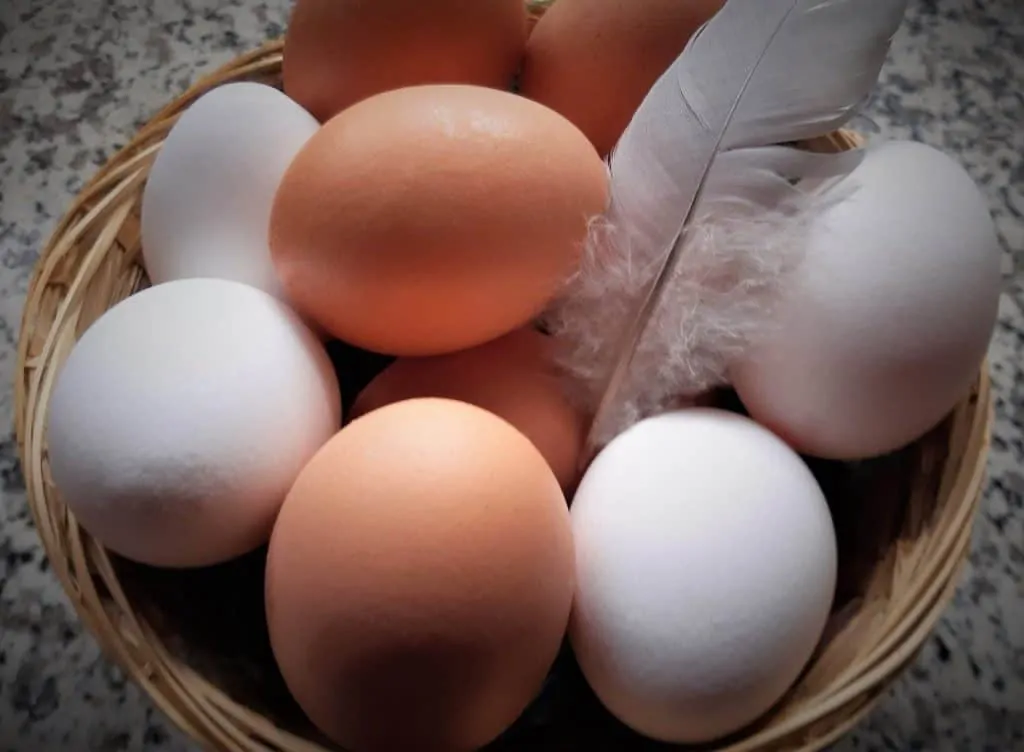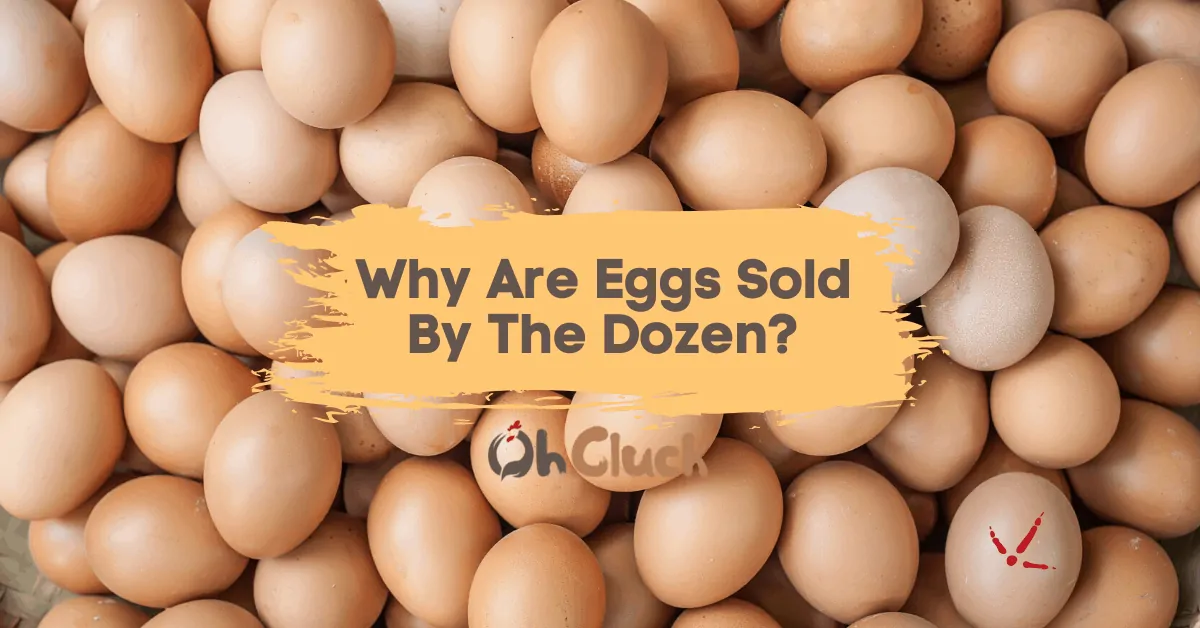Why Are Eggs Sold By the Dozen?
My wife and I collect several dozen eggs a week, a majority of the time we give them away to our family, friends, and neighbors. One day we sparked up a conversation of why are eggs sold by the dozen? It turns out, neither one of us had the answer, so we started researching.
In the late 1500s and early 1600s, eggs were sold for a penny each or twelve for a shilling in England. This measurement was adopted when it was brought over in the first century by the Romans. The system later found it’s way to the American colonies and became part of the system we now know as the U.S. customary units of measurement.
If eggs were sold the dozen for only twelve cents what was the cost to produce them back then? That was an interesting question we pondered and it got us thinking about what it cost us to produce our free-range eggs today.

How Much Does it Cost to Produce a Dozen Farm Fresh Eggs
As summer approaches, our farmers market starts to become in full swing. Fresh farm-raised eggs are usually plentiful but can be expensive there. We typically never sell or eggs there, but we thought, why not try to sell our eggs this year? After all, we are now getting more eggs produced than what we can consume, and we knew we could give a better deal than the $7.00 for a dozen other farmers are charging, right?
To calculate the cost of a dozen eggs, you need to know your cost, most common expenses are: Feed, Water, Medicine, Bedding, Chicken Replacement, and Shelter cost. Add these numbers together and divide by the total number of dozens of eggs to get your production cost.
Before we just headed on down to the farmers market, we wondered what it cost us to produce our eggs? At what cost should we sell the eggs? If we decided to go this route, we knew we wanted to break even at least make a small profit.
Calculating Our Expenses
How much does it cost to feed and water our chickens?
The areas that cost us the most money, of course, is feed; if you raise chickens, I’m sure this cost is the most costly for you as well.
We typically go through about 7, 40-pound bags of chicken feed a month. We have over 40 birds, both hens and roosters combined with more chicks growing now in the process.
Of that number about 20 hens are laying, we also have a number of broody hens and Nankins which are inconsistent in laying eggs.
If we take the average cost of our layer feed $9.00 a bag, and times the number of bags we use a month 6, we spend about $54.00 a month in chicken feed alone. This number can go up or down depending if there was waste or savings for that month.
Another cost that is less considered, although negligible, is the cost of water. Our water comes from a well, so the price is only cents in terms of the amount of electricity used to pump the water out of the ground for them.
Cost of Living Housing and Medicine Expenses for Our Chickens
Fresh bedding for them such as hay or shavings is minimal too, maybe $5.00 or so dollars a month.
Albeit, the cost of fresh bedding does fluctuate based upon the weather. Rainy or humid weather can ruin bedding, making the price go up.
For instance, these last few months have been rainy and their bedding as needed to be replaced a few times, we spend about $15.00 during the time to correct their needs.
A few other things to consider in calculating our cost is purchasing medicine to have on hand. We need medication just in case the hens or roosters get sick so that we won’t have a total loss.
This cost is usually minimal at about $10 or more a bottle. Their medicine is often a one time cost, averaging less than a few dollars a month to maintain. But it’s well worth it.
If we add it all together we spend about $60 to $75 a month on creating 24 dozen farm fresh eggs a month.
These numbers do not account for eggs that have gone bad. Which negatively effect or cost of production.
Packaging Cost for Eggs
We typically store our eggs in a chicken egg basket for ourselves, but when we are giving them to someone we usually store them in an egg carton.
The cost of the egg carton does vary, but we typically pay about $0.25 per cartoon. We have seen them go as high as a $1 apiece, but that just seems a bit too high for such a thing.
How many eggs per month do we produce?
On a good month, we average about 24 dozens eggs, sometimes more, sometimes less. Our birds go through cycles and broodiness, so this makes the numbers vary, not dramatically, but some.
Final Cost to Produce a Dozen Eggs
Adding all of our expenses together means are cost is about $3.30 give or take a few cents per dozen eggs we produce.
Is it possible that we could reduce this cost? Yes, we have a lot of roosters that roam free in our yard, if we reduced them we could reduce our feed cost, and lower the cost of production.
We also have hens that are broody, once they come out of their broodiness we can expect an increase in our monthly egg collection.
Is Raising Chickens For Eggs Worth It
My wife and I say yes it is worth it, but our reasoning is not just for eggs. Our thinking is for peace of mind and comfort. We get enjoyment out of collecting our eggs and seeing our chickens grow.
If you are looking to raise hens to save money on eggs, you will be surprised that it’s more costly to raise than to buy a dozen eggs at the grocery store. However, if you are custom to spending $5-7 a dozen at a farmers market they might be worth it.
If you desire sustainability and self-sufficiency I recommend getting a couple of hens and starting a small flock. You don’t need a rooster for your hens to lay eggs, but if you want to grow your flock you’ll need one.
Final Thoughts
It’s interesting to see how old customs are passed down from generation to generation. Even if it’s something as simple as how many eggs we bundle together to sell.
If you are considering raising chickens to save money on eggs just understand that the cost of fresh farm eggs is often double or more the price as purchasing them in the store.
The main reason behind raising hens for farm fresh eggs is to have self-sustainability if you can get your waste down and your egg production up you’ll have plenty of eggs to go around and spare.
Consider starting off with a small flock of birds, 3 is a perfect number to get your feet wet and see if you can handle the responsibility of raising your flock. Three hens should produce about a dozen eggs a week, although this does depend on the breed you choose.
If you have any questions please reach out to us at [email protected].
Thank you and have a great day, if you learned something feel free to share this article it will make our day for sure!
Happy Raising!
resources
http://www.umich.edu/~ece/student_projects/money/denom.html
OhCluck.com is a participant in the Amazon Services LLC Associates Program, an affiliate advertising program designed to provide a means for sites to earn advertising fees by advertising and linking to Amazon.com
Comments
0 comments

